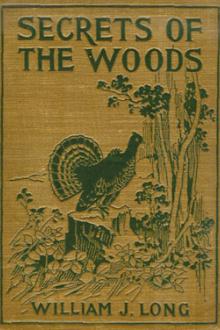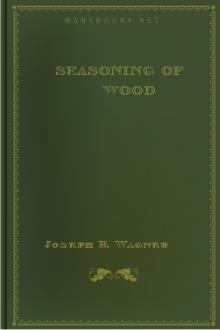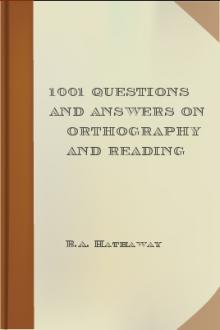Secret of the Woods - William J. Long (e reader for manga .txt) 📗

- Author: William J. Long
- Performer: -
Book online «Secret of the Woods - William J. Long (e reader for manga .txt) 📗». Author William J. Long
Then began the most fascinating experience that comes to one who haunts the woods—the first, thrilling, glorious days of the still-hunter’s schooling, with the frost-colored October woods for a schoolroom, and Nature herself for the all-wise teacher.
Daylight found me far afield, while the heavy mists hung low and the night smells still clung to the first fallen leaves, moving swift and silent through the chill fragrant mistiness of the lowlands, eye and ear alert for every sign, and face set to the heights where the deer were waiting. Noon found me miles away on the hills, munching my crust thankfully in a sunny opening of the woods, with a brook’s music tinkling among the mossy stones at my feet, and the gorgeous crimson and green and gold of the hillside stretching down and away, like a vast Oriental rug of a giant’s weaving, to the flash and blue gleam of the distant sea. And everywhere—Nature’s last subtle touches to her picture—the sense of a filmy veil let down ere the end was reached, a soft haze on the glowing hilltops, a sheen as of silver mist along the stream in the valley, a fleecy light-shot cloud on the sea, to suggest more, and more beautiful, beyond the veil.
Evening found me hurrying homeward through the short twilight, along silent wood roads from which the birds had departed, breathing deep of the pure air with its pungent tang of ripened leaves, sniffing the first night smells, listening now for the yap of a fox, now for the distant bay of a dog to guide me in a short cut over the hills to where my room in the old farmhouse was waiting.
It mattered little that, far behind me (though not so far from where the trail ended), the big buck began his twilight wandering along the ridges, sniffing alertly at the vanishing scent of the man on his feeding ground. The best things that a hunter brings home are in his heart, not in his game bag; and a free deer meant another long glorious day following him through the October woods, making the tyro’s mistakes, to be sure, but feeling also the tyro’s thrill and the tyro’s wonder, and the consciousness of growing power and skill to read in a new language the secrets that the moss and leaves hide so innocently.
There was so much to note and learn and remember in those days! A bit of moss with that curiously measured angular cut in it, as if the wood folk had taken to studying Euclid,—how wonderful it was at first! The deer had been here; his foot drew that sharp triangle; and I must measure and feel it carefully, and press aside the moss, and study the leaves, to know whether it were my big buck or no, and how long since he had passed, and whether he were feeding or running or just nosing about and watching the valley below. And all that is much to learn from a tiny triangle in the moss, with imaginary a, b, c’s clinging to the dried moss blossoms.
How careful one had to be! Every shift of wind, every cloud shadow had to be noted. The lesson of a dewdrop, splashed from a leaf in the early morning; the testimony of a crushed flower, or a broken brake, or a bending grass blade; the counsel of a bit of bark frayed from a birch tree, with a shred of deer-velvet clinging to it,—all these were vastly significant and interesting. Every copse and hiding place and cathedral aisle of the big woods in front must be searched with quiet eyes far ahead, as one glided silently from tree to tree. That depression in the gray moss of a fir thicket, with two others near it—three deer lay down there last night; no, this morning; no, scarcely an hour ago, and the dim traces along the ridge show no sign of hurry or alarm. So I move on, following surely the trail that, only a few days since, would have been invisible as the trail of a fish in the lake to my unschooled eyes, searching, searching everywhere for dim forms gliding among the trees, till—a scream, a whistle, a rush away! And I know that the bluejay, which has been gliding after me curiously the last ten minutes,—has fathomed my intentions and flown ahead to alarm the deer, which are now bounding away for denser cover.
I brush ahead heedlessly, knowing that caution here only wastes time, and study the fresh trail where the quarry jumped away in alarm. Straight down the wind it goes. Cunning old buck! He has no idea what Bluejay’s alarm was about, but a warning, whether of crow or jay or tainted wind or snapping twig, is never lost on the wood folk. Now as he bounds along, cleaving the woods like a living bolt, yet stopping short every hundred yards or so to whirl and listen and sort the messages that the wood wires bring to him, he is perfectly sure of himself and his little flock, knowing that if danger follow down wind, his own nose will tell him all about it. I glance at the sun; only another hour of light, and I am six miles from home. I glance at the jay, flitting about restlessly in a mixture of mischief and curiosity, whistling his too-loo-loo loudly as a sign to the fleeing game that I am right here and that he sees me. Then I take up the back trail, planning another day.
So the days went by, one after another; the big buck, aided by his friends the birds, held his own against my craft and patience. He grew more wild and alert with every hunt, and kept so far ahead of me that only once, before the snow blew, did I have even the chance of stalking him, and then the cunning old fellow foiled me again masterfully.
Old Wally was afield too; but, so far as I could read from the woods’ record, he fared no better than I on the trail of the buck. Once, when I knew my game was miles ahead, I heard the longdrawn whang of Wally’s old gun across a little valley.
Presently the brush began to crackle, and a small doe came jumping among the trees straight towards me. Within thirty feet she saw me, caught herself at the top of her jump, came straight down, and stood an instant as if turned to stone, with a spruce branch bending over to hide her from my eyes. Then, when I moved not, having no desire to kill a doe but only to watch the beautiful creature, she turned, glided a few steps, and went bounding away along the ridge.
Old Wally came in a little while, not following the trail,—he had no skill nor patience for that,—but with a woodsman’s instinct following up the general direction of his game. Not far from where the doe had first appeared he stopped, looked all around keenly, then rested his hands on the end of his long gun barrel, and put his chin on his hands.
“Drat it all! Never tetched ‘im again. That paowder o’ mine hain’t wuth a cent. You wait till snow blows,”—addressing the silent woods at large,—“then I’ll get me some paowder as is paowder, and foller the critter, and I’ll show ye”—
Old Wally said never a word, but all this was in his face and attitude as he leaned moodily on his long gun. And I watched him, chuckling, from my hiding among the rocks, till with curious instinct he vanished down the ridge behind the very thicket where I had seen the doe flash out of sight a moment before.
When I saw him again he was deep in less creditable business. It was a perfect autumn day,—the air full of light and color, the fragrant woods resting under the soft haze like a great bouquet of Nature’s own culling, birds, bees and squirrels frolicking all day long amidst the trees, yet doing an astonishing amount of work in gathering each one his harvest for the cold dark days that were coming.
At daylight, from the top of a hill, I looked down on a little clearing and saw the first signs of the game I was seeking. There had been what old people call a duck-frost. In the meadows and along the fringes of the woods the white rime lay thick and powdery on grass and dead leaves; every foot that touched it left a black mark, as if seared with a hot iron, when the sun came up and shone upon it. Across the field three black trails meandered away from the brook; but alas! under the fringe of evergreen was another trail, that of a man, which crept and halted and hid, yet drew nearer and nearer the point where the three deer trails vanished into the wood. Then I found powder marks, and some brush that was torn by buck shot, and three trails that bounded away, and a tiny splash of deeper red on a crimson maple leaf. So I left the deer to the early hunter and wandered away up the hill for a long, lazy, satisfying day in the woods alone.
Presently I came to a low brush fence running zigzag through the woods, with snares set every few yards in the partridge and rabbit runs. At the third opening a fine cock partridge swung limp and lifeless from a twitch-up. The cruel wire had torn his neck under his beautiful ruff; the broken wing quills showed how terrible had been his struggle. Hung by the neck till dead!—
an atrocious fate to mete out to a noble bird. I followed the hedge of snares for a couple of hundred yards, finding three more strangled grouse and a brown rabbit. Then I sat down in a beautiful spot to watch the life about me, and to catch the snarer at his abominable work.
The sun climbed higher and blotted out the four trails in the field below. Red squirrels came down close to my head to chatter and scold and drive me out of the solitude. A beautiful gray squirrel went tearing by among the branches, pursued by one of the savage little reds that nipped and snarled at his heels. The two cannot live together, and the gray must always go. Jays stopped spying on the squirrels—to see and remember where their winter stores were hidden—and lingered near me, whistling their curiosity at the silent man below. None but jays gave any heed to the five grim corpses swinging by their necks over the deadly hedge, and to them it was only a new sensation.
Then a cruel thing happened,—one of the many tragedies that pass unnoticed in the woods. There was a scurry in the underbrush, and strange cries like those of an agonized child, only tiny and distant, as if heard in a phonograph. Over the sounds a crow hovered and rose and fell, in his intense absorption seeing nothing but the creature below. Suddenly he swooped like a hawk into a thicket, and out of the cover sprang a leveret (young hare), only to crouch shivering in the open space under a hemlock’s drooping branches. There the crow headed him,





Comments (0)